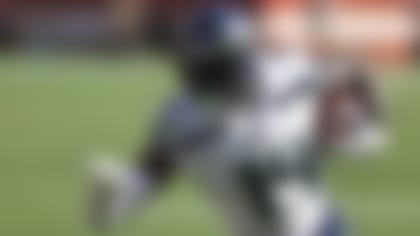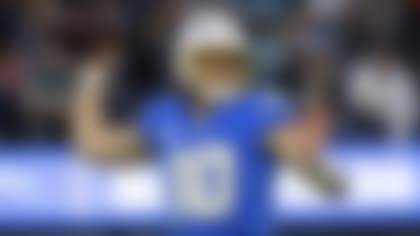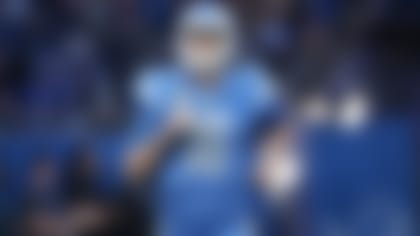It's finally here. Football is back and with that, so is the greatest thing ever created -- fantasy football! But setting your Week 1 lineup can feel like taking a test on the first day of school. You have an idea on what the right choice is, but we learn a lot about usage, snap shares and opposing defenses in the early weeks of the season. Still, you have to use what we know and make the best lineup decision.
Each week this article will break down the upcoming matchups to give you everything you need to know and help you set your lineup!
This has the potential to be one of the most fantasy friendly games in the Week 1 slate. First, on the Eagles side of things, Jalen Hurts is a must start option in Week 1, unless you somehow have him paired with one of the elite options. Hurts averaged 23 fantasy points per game as a starter last season and rushed for over 60 yards in each of his three full starts. It's a small sample size, but Hurts is one of the best pure running QBs in the NFL. That bodes well against the Falcons, who allowed the ninth-most rushing yards to QBs (344) and the fifth-most rushing touchdowns (six). They also gave up the second-most fantasy PPG to QBs in 2020 (23.32). Atlanta is also a friendly matchup for the pass catchers in this game. Last season, the Falcons allowed the most fantasy PPG to WRs (45.2) and have finished in the top five in two of the past three seasons. Last season, they gave up 209 yards per game to the position. DeVonta Smith should be started in his NFL debut. As the top target in this offense, with a great matchup, he should come with a safe floor and a high ceiling. Smith is the only WR in Philly to trust right now, but not the only pass catcher. Last season, the Falcons gave up the fourth-most fantasy PPG (15.41) and touchdowns (10) to tight ends. Since they have two, both Dallas Goedert and Zach Ertz are on that TE 1/2 borderline. The one position the Falcons were tough on last year was running back, as they limited the position to the seventh-fewest fantasy PPG (20.7) and the second-fewest rushing yards per game (70.6) to running backs. Given the passing down concerns with Miles Sanders, he is purely a low-end RB2 in this matchup.
The Falcons offense is straight forward. Calvin Ridley is matchup proof, so it doesn't matter that the Eagles defense gave up the ninth-most fantasy PPG to WRs (39.51), you are starting him either way. If you have Kyle Pitts, you likely took him as a top-five tight end, meaning you are starting him in Week 1. It doesn't hurt that the Eagles issued 52 yards per game and nine total touchdowns to tight ends last year. Mike Davis is not matchup proof, but given the workload he is projected for, you have to start him early on. The Eagles were stingy against RBs last year, giving up 87 rushing yards and 4.3 catches per game to backs. But still, Davis is still an RB2 this week. Matchups matter for the rest of the Falcons. The Eagles were middle of the pack against QBs last season, which is exactly where Matt Ryan is amongst QBs for Week 1. He is not a must-start option, but he is a high-end QB2 in case your starter has a tough matchup or in two QB formats. Russell Gage is a safe floor play in a favorable matchup, but the chances are you have a better option to start on your roster.
This is a rematch from last season. In that game, Ben Roethlisberger threw for 187 yards, two touchdowns and two interceptions. Not a great stat line, plus the Bills issued just 245 passing yards per game and 23 total passing touchdowns to QBs last year. Roethlisberger should be benched in all one-QB formats. That game last year was strange since it was the game Diontae Johnson was benched for drops, but he still finished with four catches for 40 yards on seven targets, while JuJu Smith-Schuster had six catches for 55 yards on seven targets. Chase Claypool added three catches for 15 yards on six targets. The Bills allowed the fifth-fewest fantasy PPG (32.4) to wide receivers last year. Still, this is one of the best trios in the league and the Bills won't be able to limit all three. Johnson was the top target in 2020 and projects to be again, so he should be started as a WR2. Smith-Schuster and Claypool are more in the WR3 range, with the likelihood that someone disappoints. Eric Ebron is not a starting option, regardless of matchup. The Bills allowed 97 rushing yards per game and 16 total touchdowns to running backs last year. Najee Harris will see enough volume to start weekly, but the Steelers' best bet in this game is to establish the run. He is an RB1 in Week 1.
Josh Hines-Allen struggled in that matchup last season completing just 24 of 43 passes for 238 yards, two touchdowns, an interception and 28 rushing yards. He still went for 18 fantasy points, which is good, but not a normal Allen game. Still, Allen is a must start, even against the Steelers, who allowed the second-fewest fantasy PPG to QBs (14.17). Stefon Diggs went off in that game, going for 10 catches, 130 yards and a TD on 13 targets. He is an obvious must start option as well. The Steelers were tough on WRs last season, meaning you can sit Cole Beasley, Gabe Davis and Emmanuel Sanders, especially while we figure out how the targets will be distributed. Dawson Knox is no where near a tight end that you should trust in fantasy. As for the RBs, the Steelers are a tough matchup. They allowed just 85 rushing yards per game, 3.2 catches per game and the second-fewest fantasy PPG (18.73) to the position. Given that the workload is so questionable between Devin Singletary and Zack Moss, both can be benched.
Zach Wilson will make his NFL debut against the Panthers, who ranked middle of the pack against QBs last season. They gave up 252 yards per game and 28 passing touchdowns to the position last year. With it being Wilson's first start, the possibility the Jets rely on the run is strong. Wilson has a ton of arm talent, but do not start him in one-QB leagues. Speaking of the run game, the Panthers issued 98 rushing yards per game, 24.6 fantasy PPG and the third-most catches per game (6.0) to RBs last season. Tevin Coleman is the Jets' starting RB entering the season, making him a flex option in this game. Michael Carter remains a home run swing until we have a better idea on his workload. The Panthers were middle of the pack against receivers. The Jets will be without Jamison Crowder and Keelan Cole is taking it down to the wire. That means an increased volume for Corey Davis and Elijah Moore. Davis is the top option and could be trusted as a WR2, with more upside, after the volume he saw from Wilson this preseason. Moore missed much of the preseason due to injury, but he is healthy and should see all the action out of the slot against the Panthers this week. He is a flex option, but we know he is explosive, so he always comes with the upside of outperforming his ranking. Tyler Kroft also gets a bump in volume with the other options out, but he's still more of a TE2 option in the opening week. The Panthers did issue 56 yards per game and eight touchdowns to tight ends last season.
Did someone say revenge? In his first game since the Jets traded him, Sam Darnold faces the team that drafted him just three years ago. It's a strong matchup as the Jets allowed the third-most fantasy PPG to QBs last season (22.01), including 285 passing yards per game and 33 passing touchdowns. The Jets have a revamped defense, but they are now lacking pass rushers due to injuries. Darnold is a high-end QB2 in his first game as a Panther. The Jets allowed 174 yards per game to receivers and 16 touchdowns to the position. D.J. Moore and Robby Anderson (another revenge game!) should be started in this favorable matchup. Moore has the fourth-best Week 1 cornerback matchup, according to PFF. Terrace Marshall Jr. has upside and should be rostered, but until we see what his workload looks like, he can be left on the bench. Christian McCaffrey is matchup proof, so why even tell you that the Jets allowed 6.2 receptions per game to RBs, the second most in the NFL. Dan Arnold has some deep-league sleeper appeal, as the Jets allowed the most fantasy PPG to TEs last season.
Dalvin Cook is a must-start option no matter the matchup, but he can especially go off this week against Cincinnati, which allowed 126 rushing yards per game to RBs, the fourth-most in the NFL. Kirk Cousins is a low-end QB1 in a favorable matchup against the Bengals, who allowed two passing touchdowns per game to QBs last season. The Bengals limited receivers last year, but they did issue 20 touchdowns, the fifth-most in the NFL. Justin Jefferson is matchup proof, but he does have the sixth-best cornerback matchup in Week 1, according to PFF. Adam Thielen can be trusted as a WR2 in this game, given the matchup and the fact that the passing volume is funneled between the top-two options. With Irv Smith out for the year, Chris Herndon and Tyler Conklin will share reps, but neither should be started in fantasy.
This is Joe Burrow's first game back since the ugly knee injury that ended his season early last year. He played just one drive this preseason and has spoke about shaking off rust and the urge to protect his leg. The Vikings ranked in the bottom third of the NFL in terms of fantasy PPG to QBs (17.99). Burrow always has a high ceiling, but this is a spot where you can play it safe if you have another trustworthy option. If Burrow looks great, then you can start him from Week 2 on. The three receivers here will have a strong matchup against the Vikings, who allowed the sixth-most fantasy PPG to the position (40.83). That includes issuing 179 yards per game and 24 total TDs to receivers. Tee Higgins and Tyler Boyd can be trusted as WR3s, while Ja'Marr Chase, who has struggled this preseason, is more of a flex option. All three have the upside to outperform that ranking though. Joe Mixon should always be started, but especially against the Vikings, who issued the sixth-most fantasy PPG (26.48) and rushing yards per game (113.6) to RBs last year.
The Lions allowed the most fantasy PPG (23.83) to QBs last season, including 297 pass yards per game and a league-high 38 passing touchdowns. Jimmy Garoppolo has a high ceiling, but the threat of a QB rotation still keeps him in the QB2 territory. The Lions also struggled against the run, giving up the most fantasy PPG to RBs (32.47), including 116 rushing yards per game to go with 48 receiving yards per game, plus 29 total touchdowns to the position. Raheem Mostert is a top-15 RB with upside to finish much higher. The only concern is how much work will Trey Sermon see, who should also be valued as a top-30 RB, with upside. George Kittle is a must-start option regardless of matchup. The Lions also allowed the third-most fantasy PPG to receivers (44.11) with 22 touchdowns allowed. There is some pass game volume concerns, but Brandon Aiyuk is still a fantasy WR2. Based on PFF's WR/CB matchup chart, Aiyuk has the most favorable matchup in Week 1. Deebo Samuel is more in the flex range, but the upside here for both is higher than the rank. He has the ninth-best cornerback matchup this week.
Things are not as fantasy friendly for the Lions. Jared Goff meets his old division rival, which allowed 219 passing yards per game last year, the fourth-fewest in the NFL. Goff can be benched. The Niners also allowed the sixth-fewest fantasy PPG to RBs last season (20.36), including just 74 rushing yards per game. D'Andre Swift can still be started as a low-end RB2 and while the Lions say there is no limits for him, but after missing much of the preseason, there is still some injury risk here. Jamaal Williams is not nearly as appealing now that it looks like Swift will be a full-go, but he could see more work to ease Swift back into things. He is a flex option this week. While we are excited about Amon-Ra St. Brown, this is not the week to start him. The Lions receivers can be benched, while T.J. Hockenson should be started weekly, regardless of matchup.
Trevor Lawrence will make his much-anticipated NFL debut, just three years after being crowned the next generational QB. Lawrence has a fantastic matchup to open the season against the Texans, who allowed the sixth-most fantasy PPG to QBs last year (20.19) including 270 passing yards per game and 30 touchdowns. Both Jake Luton and Gardner Minshew topped 300 yards against the Texans last year. Lawrence is in a great spot to come out firing in his first career game and should be started in 12-team leagues or deeper. Recently my bold prediction on Fantasy Live was he would throw for four touchdown passes in this game. If you are starting Lawrence, chances are you should feel confident starting the receivers here, as well. The Texans struggled against receivers last season, allowing the seventh-most fantasy PPG (40.24) including 174 yards per game and 22 total touchdowns. Marvin Jones Jr. and Laviska Shenault Jr. are the top options and should be trusted as WR3 with upside to finish much higher. D.J. Chark is more of a flex option as he continues to work his way back from a finger injury that sidelined him much of the preseason. Shenault has some added value as he could be utilized in the run game. The Texans struggled to stop the run last year, giving up 191 scrimmage yards per game and 22 total touchdowns to RBs. It equated to 31.84 fantasy PPG, the second-most in the NFL. James Robinson can be started with confidence.
I won't sugar coat it, things are not the most fantasy friendly when it comes to the Houston Texans offense. The Jaguars are typically a defense you can start players against, but really, the only startable option in Houston is Brandin Cooks. The Jags were middle of the pack last season against WRs, but Cooks went off both times he faced them last season. He went for 161 yards and a TD en route to a 30-point day and followed it up with 83 yards and a touchdown for 17 fantasy points in the second matchup. He won't have Deshaun Watson throwing to him, but he is at least flex worthy in this matchup. Nico Collins is a sleeper, but not someone you can trust out the gate. Tyrod Taylor has sneaky value in a two-QB league for those who waited on grabbing a second quarterback because of what he can give with his legs, but you want no part of him in one-QB leagues. The issue with the Texans' passing game is they plan to be a slow-paced, run-heavy offense, meaning that any of these options can disappoint. The Jags did struggle against the run, but the Texans have five RBs on the roster and the workload distribution still seems uncertain. Phillip Lindsay and Mark Ingram are expected to get the most work, but David Johnson and Rex Burkhead will also be involved. Lindsay is the top option, but even he is more of a desperation flex option until the workload is figured out.
The Colts allowed the 10th-fewest fantasy PPG to QBs last season, giving up just 16.96 per game. That includes 255 passing yards per game and 24 total touchdowns. It is not the best matchup, but Russell Wilson is still Russell Wilson, who scored over 18 fantasy points in 12 of 16 games last year and has been a consistent fantasy asset for years. Start him even in a tough matchup. The Colts were middle of pack against receivers, but just like with Wilson, you invested too much draft capital on both DK Metcalf and Tyler Lockett to even think of sitting them. Plus, both can go off against anyone, all it takes is one deep ball from arguably the best deep ball thrower in the game. The Colts were stingy to RBs last year, just allowing 74 rushing yards per game and 10 rushing TD all year. But, they did give up over five catches per game to the position. Chris Carson was more utilized in the passing game last season and while he is not a slam dunk in this matchup, he is still an RB2 in the opening week. Gerald Everett could have a breakout season this year, but the Colts are a tough first matchup. Last season they only allowed 45 yards per game and three touchdowns all season to tight ends. This is a week to use another streaming option, if possible.
The Colts had an interesting offseason, but just like they drew it up, they will have Carson Wentz under center in Week 1. The Seahawks defense was a tale of two seasons last year, being historically bad in the first half before improving mightily as the season went on. Overall, Seattle issued the 10th-most fantasy PPG to QBs (19.73). Wentz, dealing with the foot issue, is purely a desperation start in deep formats. The Seahawks were middle of the pack against RBs, limiting them to 74 rushing yards per game, but they did issue 5.8 catches and 40 receiving yards per game to backs. Jonathan Taylor sees enough volume to warrant starting weekly and given the Seahawks struggles against pass-catching RBs, Nyheim Hines is a flex option. In the passing game, the only real option you want to trust is Michael Pittman. He has some breakout potential and last season the Seahawks gave up plenty of big games to receivers. Parris Campbell is a flex option in deeper leagues.
This game has the potential to be one of, if not the highest scoring matchups on the Week 1 slate. Kyler Murray is a must-start option, especially against the team that allowed the fifth-most fantasy PPG to QBs (21.23). He brings such a safe floor and high ceiling due to his rushing abilities and very well could be the top-scoring QB in Week 1. DeAndre Hopkins is another must start regardless of the matchup. He also has the eighth-best cornerback matchup, according to PFF. The Titans did allow the second-most fantasy PPG to WRs (44.81), including 195 yards per game and 22 touchdowns. Despite that, the target distribution is still unclear as A.J. Green, Christian Kirk and Rondale Moore compete to be the number two target. For now, they are all purely deeper league starts, but Moore is a strong stash candidate. Chase Edmonds and James Conner will split RB duties, with Edmonds the clear pass catcher. The Titans last season gave up the third-most receiving touchdowns to RBs (three) and the seventh-most fantasy PPG to the position (25.79). Edmonds is the upside play here for sure and the preferred option of the two. He is a low-end RB2 or flex option, but has a higher ceiling than that. Conner is more of a flex option.
The Titans offense is pretty straight forward. Derrick Henry, A.J. Brown and Julio Jones are all must starts. But, you drafted them in the early rounds of your draft so you know this. Jones has the third-best matchup, while Brown has the seventh best, according to PFF's WR/CB matchups. The Cardinals were middle of the pack against both the pass and run last season. But, given the firepower that the Titans have on offense and that this could be a very high-scoring matchup, Ryan Tannehill is an easy QB1 this week. Since he took over as the Titans starter, he is averaging nearly 22 fantasy PPG and has thrown multiple passing TDs in 20 of 26 starts. Trust this offense.
The Chargers kick off their first game in their new offensive system with a tough matchup against the WFT. Last season, the Football Team allowed a league-low 210 passing yards per game to QBs. They also allowed just 21 touchdowns for an average of 1.3 per game. They also allowed just one top-15 QB in their final 11 games. Justin Herbert opens with a tough matchup and is not a must-start option. He is not even a top-15 QB this week. Washington was also tough on running backs, giving up the third-fewest fantasy PPG to the position last season (18.77). They gave up just 3.8 catches per game to RBs, but Austin Ekeler is not your traditional RB. If Washington gets quick pressure on Herbert, it could lead to a lot of quick dump-off passes to Ekeler. You have to monitor his health as he has missed practice, but if he plays, he is still a must-start. Washington was also tough on receivers, allowing the third-fewest fantasy PPG (31.71). Noticing a trend? This defense is tough and not one to stream against. Keenan Allen is a must-start even in bad matchups, and he could see a lot of short, quick targets. Mike Williams can be left on the bench in this tough matchup, as Herbert likely won't have a lot of time to air it out deep. Jared Cook can be benched against the team that issued the eighth-fewest fantasy PPG to tight ends (11.08).
As for Washington, it is led by new QB Ryan Fitzpatrick, who we know has a high ceiling, but a low floor. The Chargers did allow the 11th-most fantasy PPG to QBs last season, but that number is deceiving. It is propped up by a league-high eight rushing TDs allowed to QBs. They limited pass throwers to just 229 yards and 1.7 touchdowns per game. Fitzy is not a QB1 this week, but he is someone you can start in two-QB formats. The Chargers ranked middle of the pack against running backs, but they did allow the fifth-most receptions per game to the position (5.8). That bodes well for Antonio Gibson, who we are hoping will get more pass game usage this season. J.D. McKissic caught a ton of balls last year, but that was a product of Alex Smith. He should still have a role, but how large of one is unclear. For the time being, he is purely a deeper flex option. Terry McLaurin has a chance to explode this season playing with Fitzpatrick, who is the best deep ball thrower of McLaurin's young career. He is also not afraid to pepper his top option with targets and will throw plenty of 50/50 balls. He has the second-best cornerback matchup according to PFF and should be started as a WR1 this week. With Curtis Samuel out with a groin injury, that likely leads to more targets for Logan Thomas. The Chargers gave up the 12th-most fantasy PPG to TEs (13.03), including allowing them to score 10 times. Dyami Brown is a deep sleeper, although he is more of a bench stash than someone to start.
The Browns offense has many people excited and it will be put to the test immediately against the Chiefs. Last season, the Chiefs allowed the 12th-most fantasy PPG to QBs (19.34) but that is inflated by seven rushing TDs allowed. They only allowed 246 passing yards per game. Baker Mayfield may have to throw more than usual to keep up with the Chiefs' high-powered offense, but you can expect the Browns to try to run the ball often and control the clock early on. Last year in the playoffs against Kansas City, Mayfield threw for 204 yards with a touchdown and interception. He is a QB2 this week. Nick Chubb is a must-start each week, especially against the Chiefs, who gave up the eighth-most fantasy PPG to RBs (25.68) including 101 rushing yards per game. The Chiefs also gave up 5.9 catches per game to backs, the fourth-most in the league. When these teams met in the playoffs, Chubb went for 69 rushing yards, and had two catches for four yards, but on five targets. Kareem Hunt typically is the pass-catching back for the Browns and could be used a lot if they are trailing late. But he had just one target when these teams met in the playoffs. The Chiefs gave up the second-fewest fantasy PPG to WRs (30.44). Odell Beckham will likely be playing his first game since tearing his ACL. He has a high ceiling, but given the circumstances, he is just a WR3. Jarvis Landry had seven catches for 20 yards and a TD on 10 targets when they met in the playoffs. He is a flex option. Austin Hooper had two catches for 16 yards on three targets in that matchup. He is purely a TE2 and you likely have better options.
The Chiefs offense is as straight forward as it gets, regardless of the opponent. You start Patrick Mahomes, Clyde Edwards-Helaire, Tyreek Hill and Travis Kelce no matter what. Last year in the playoffs, Mahomes threw for 255 yards and a touchdown, while adding in 14 yards and a TD with his legs. Hill went off for eight catches and 110 yards on 10 targets, while Kelce had eight catches for 109 yards and a TD on 10 targets. The Browns did issue the eighth-most fantasy PPG to receivers last year (39.65). Mecole Hardman is a boom-or-bust flex option in this one. This is the best offense in the game for a reason. Start them.
There are plenty of reasons to get excited about the Dolphins offense, but this just isn't the week to do so. The Patriots are returning many of the players who sat out last year due to COVID-19 and it's possible their defense looks more like its dominant self from two years ago. Tua Tagovailoa has breakout upside this season, but it's a tough go against the revamped Patriots defense who allowed the sixth-fewest fantasy PPG to QBs last season (16.26). He is a QB2 in the opening week. Myles Gaskin is a RB2 against a Patriots defense that ranked middle of the pack against running backs last season. Will Fuller will miss this game serving his last game of a suspension, meaning you should expect more work to go the way of DeVante Parker and Jaylen Waddle. Last season, the Pats allowed the eighth-fewest fantasy PPG to receivers (33.42). Due to the tough matchup, both Parker and Waddle are more in the flex range, although Waddle is explosive so he always has a shot at reeling in a deep ball. The Patriots were very tough against tight ends, giving up the fourth-fewest fantasy PPG (10.52) to the position. Mike Gesicki is a high-end TE2 in the opening week.
As for the Patriots, there are a lot of unknowns with how this offense will look. The one known factor is Damien Harris will be the lead back on the ground, while James White will handle passing down duties. The Dolphins were in the bottom third of fantasy PPG to RBs (21.36) and only allowed 4.5 catches per game to the position. Harris is a low-end RB2, with upside, while White is a safe-floor flex option. Mac Jones ran with the twos throughout preseason, so we are not sure exactly who his top target will be, although Jakobi Meyers is the most likely candidate. The Dolphins did give up the 11th-most fantasy PPG to WRs (38.86), but still, Meyers is more of a flex option until we get some certainty here. Nelson Agholor is purely a deep league option. The Dolphins allowed the sixth-fewest fantasy PPG to TEs (10.70), which does not bode well for both Jonnu Smith and Hunter Henry. Smith is the preferred play, as Bill Belichick has spoke up his abilities after the catch and he could be their top red zone weapon. Still, he is a borderline TE1/2, while Henry is just a deeper option. Don't get too cute and start Jones in his NFL debut against a defense that led the NFL in takeaways per game and gave up the fourth-fewest PPG last year.
After giving us quite a scare this summer, No. 12 will be under center for the Packers. And there is a simple rule of thumb. If Aaron Rodgers is starting on the field, he's starting in your lineup. The Saints are a tough matchup, as they allowed the fourth-fewest fantasy PPG to QBs last season (15.83) and we know they can get after a QB quickly. Still, Rodgers scored over 18 fantasy points in 15 games last year. Just like Rodgers, Davante Adams is matchup proof. It doesn't matter that the Saints were in the bottom third in fantasy points allowed to receivers, Adams has scored at least 16 fantasy points in 83% of his games since 2018. You always start him. You can get away from the other Packers receivers as there is no clear second option. Aaron Jones has the toughest matchup a running back can face going against the Saints, who allowed a league low 17.92 fantasy PPG to the position. Still, you have to start Jones if you have him, but you may not get his normal production. Robert Tonyan could be started based off the state of the tight end position and that the Saints ranked middle of the pack against tight ends, including allowing nine scores.
Jameis Winston will make his first Saints start against a Packers defense that allowed the fifth-fewest fantasy PPG to QBs (16.12), including allowing just 237 yards and 1.4 passing touchdowns per game. Due to the tough matchup, he is purely a low-floor, but high-ceiling QB2. Alvin Kamara is a must-start, but especially against the Packers, who gave up the fifth-most fantasy PPG to RBs (27.15) including 5.8 catches per game. Kamara could easily see double-digit targets in this one if the Saints are chasing points. Marquez Callaway is the only Saints receiver to trust, but even he is more of a boom-or-bust WR3. We know the deep play abilities he has, as he showcased on two great long touchdown catches in the preseason. But the Packers issued the fourth-fewest fantasy PPG to receivers last year (32.33). Tre'Quan Smith was a mid-week addition to the practice report with a hamstring injury, which is scary. You cannot trust him this week. The Packers only allowed 14 catches of 20+ air yards last season, the fourth-fewest in the NFL. Juwan Johnson and Adam Trautman both have some upside, but until we get some clarity you can get away from them this week.
Teddy Bridgewater won the starting QB job for the Denver Broncos, but that does not mean he has to start for your fantasy team. Especially against the Giants, who allowed the sixth-fewest fantasy PPG to QBs last season (16.26). But, Bridgewater does mean good things for Jerry Jeudy, as they are a really nice fit together. Jeudy is a great route runner who will quickly get open and Bridgewater will find the open target. Jeudy and Co. face a tough Giants secondary which was in the bottom third of the NFL in fantasy points allowed to receivers. Jeudy or Sutton, perhaps both, will see a lot of James Bradberry. Jeudy is the preferred option as not only is he a better fit with Bridgewater, but Sutton is working his way back from a torn ACL and this is his first game back. It could take him a couple weeks to look back like himself. He is a boom or bust flex option this week, while Jeudy is a WR3 with upside. Noah Fant is a borderline TE1 against a Giants defense that allowed just four touchdowns to tight ends last season.
The Giants are a hard offense to trust out the gate. Daniel Jones is too turnover prone to trust even against the defense that allowed the ninth-most fantasy PPG to QBs (19.78). Saquon Barkley is the Giants player that fantasy managers most want to know about. The Broncos did allow 101 rushing yards per game and 16 total touchdowns to RBs last year. Barkley comes with a lot of questions headed into Week 1 -- is he completely over the ACL injury and 100 percent? Will the Giants limit his touches? And if they do, how many touches is the limit? Due to these questions, Barkley is a top-20 RB, but barely. His upside is high enough to warrant starting him, but just understand the risk. Kenny Golladay is expected to play after missing most of training camp and preseason. It's great to have him available, but the Broncos did a good job limiting receivers last season. Due to the matchup and the uncertainty with his heath, he is purely just a flex option. The same can be said about Sterling Shepard, who will operate out of the slot and has a strong chance of leading this team in catches. Evan Engram is not expected to play, which means more run for Kyle Rudolph, but he is still purely a deep league option. Kadarius Toney is a player to watch his usage in this one.
For all those who want to see Justin Fields, you have to wait as Andy Dalton is getting the start against the Rams. The Rams allowed the fewest fantasy PPG to QBs (13.52), including just 212 passing yards per game and 17 passing touchdowns. Do not use Dalton even in two-QB formats. It's a tough matchup for the receivers going against Jalen Ramsey and the Rams secondary. Last year, receivers averaged a league-low 28.19 fantasy PPG against them. Last year against the Rams, Allen Robinson scored 11 fantasy points on four catches for 70 yards. That is a safe floor and he should still be started. But you can get away from Darnell Mooney this week. The Rams also allowed the ninth-fewest fantasy points to tight ends (11.57). We still have to see how Cole Kmet and Jimmy Graham split usage, so this week both are purely TE2s in a hard matchup. You likely have a better option. David Montgomery will have his hands full against the defense that allowed the fourth-fewest fantasy PPG to RBs (20.05). It allowed just 76 rushing yards per game and eight rushing touchdowns all year. The volume he should see makes him a low-end RB2, but this is a tough week and he may not give you his normal output.
The Rams will also be led by a new QB, with Matthew Stafford leading the way in L.A. now. He opens up with a tough matchup against the Bears, who allowed 17.46 fantasy PPG to the position, in the bottom third in the NFL. Stafford can still put up numbers, but due to the matchup, he is on the borderline of being a QB 1/2, meaning you may have a better option on your roster. Robert Woods and Cooper Kupp can both be started as WR2s in this matchup. The Bears did issue the seventh-fewest fantasy PPG to WRs (32.88), which is not ideal, but they also struggled against slot receivers. Last year, they issued 8.5 yards per attempt to slot receivers, the sixth-most in the league. Woods and Kupp will split time in the slot. Tyler Higbee is a sneaky option as the Bears allowed the second-most fantasy PPG to TEs (15.7), including 58 yards per game and 12 touchdowns to the position. He is a top-12 this week. Darrell Henderson faces the defense that allowed the ninth-fewest fantasy PPG to RBs (21.02), including just 11 touchdowns to the position all season. Still, Patrick Claybon expects an RB1 week, but I have him ranked more as an RB2.
Lamar Jackson is always a must-start option, but especially this week. The Raiders allowed the seventh-most fantasy PPG to QBs (20.06) and gave up 126 total rushing yards per game. Plus, Jackson loves playing on Monday night. He has done so three times and averages nearly 29 fantasy PPG and twice finished as the QB1. Gus Edwards suffered a knee injury on Thursday, and then brought in Latavius Murray. That leaves them now with Ty'Son Williams, Murray, Le'Veon Bell and Devonta Freeman on the roster. The Ravens RBs have a great matchup against the Raiders, who allowed the fourth-most fantasy PPG to RBs (28.75), which includes 22 total touchdowns allowed to the position. The question, though, is which back will lead the backfield in touches Week 1. Since the other three were just signed this week, the belief is that Williams will lead the backfield in the opener, but the uncertainty still makes him more of a flex option. Murray would be the next option to trust, but again, due to the uncertainty, he remains a deeper flex option. But the Ravens typically utilize a second RB. Bell could be sprinkled in, but not enough to trust using him. The running back situation here needs to be monitored leading up to kickoff and certainly moving forward. The Raiders ranked middle of the pack against both receivers and tight ends. Mark Andrews is a must start option regardless of the opponent, but with the Ravens missing some pieces, he could see an even larger target share, especially after getting paid. Marquise Brown is a boom-or-bust flex option as we know his downfield abilities. Sammy Watkins is purely an option for deeper leagues.
Derek Carr opens up in a tough matchup against the Ravens, who allowed the ninth-fewest fantasy PPG to QBs (16.92), including just 236 pass yards per game allowed. He is not a QB1 and should only be used as a deeper option in two-QB formats. Darren Waller is as matchup proof as they get, so you are starting him against the Ravens, who ranked middle of the pack against tight ends. Baltimore ranked in the bottom third in the league in terms of fantasy PPG allowed to RBs, including allowing just seven rushing touchdowns. It's a rough first matchup for Josh Jacobs, who already has to worry about Kenyan Drake stealing volume from him. Jacobs is a low-end RB2 in this one, while Drake is purely a flex option. How the two are used though will give us a lot of answers about this backfield. The Raiders have two young, fun receivers in Henry Ruggs III and Bryan Edwards, but this is not the week to use them. The Ravens allowed the ninth-fewest fantasy PPG to receivers (33.48) and we need to see what the usage will look like for the young duo. They are more stash options for now.












